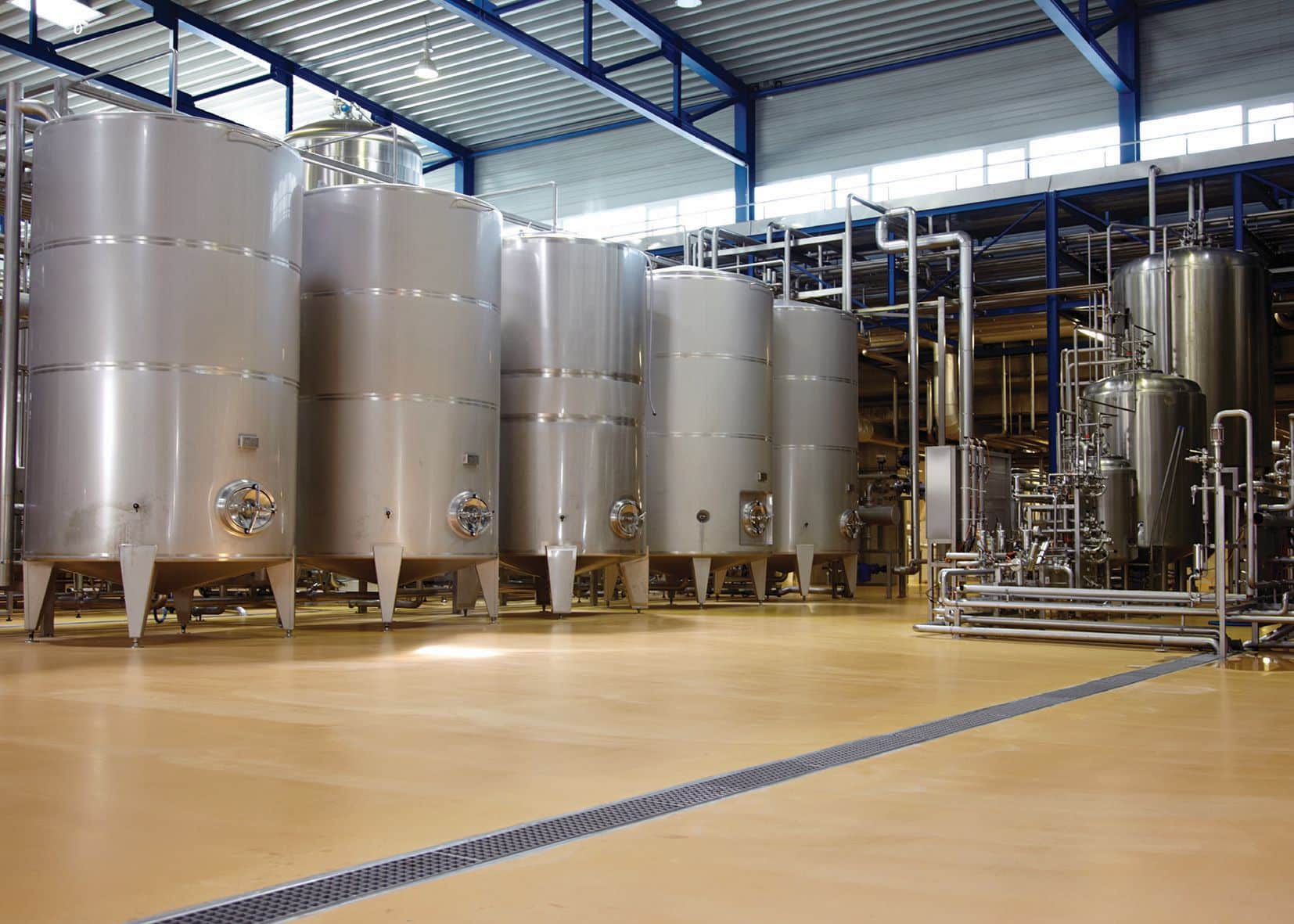The food and beverage flooring industry has numerous safety and health considerations that need to be taken into account. Among the many factors that play a role in ensuring the safety of food products and the well-being of personnel involved in manufacturing, flooring is often overlooked.
The significance of acid/chemical-resistant flooring that is non-slip and hygienic cannot be overstated. To maintain safety and health standards in the food and beverage sector, we highly recommend that customers utilise our flagship Polyscreed® range of flooring solutions.
The entire Polyscreed® range is not only durable and robust, but it is also HACCP-compliant and features antimicrobial silver-ion technology to ensure maximum hygiene in every application.
The Polyscreed® range can help address important health and safety considerations when dealing with the unique requirements and challenges of the food and beverage manufacturing industry.
Food Safety
Good quality flooring is essential for maintaining a clean and hygienic environment, which is of critical importance in the food and beverage industry. To ensure hygiene, the flooring should be seamless and non-porous, preventing moisture absorption and microbial growth.
This type of flooring needs to be resistant to moisture ingress, chemical corrosion, and contamination caused by food spills. Polyscreed® flooring is an excellent choice as it can prevent the growth of bacteria, fungi, mould, and mildew while also making cleaning and sanitising processes easier.
Slip Resistance
The potential for spills is high the food and beverage manufacturing sector, with liquids and other substances frequently landing on the floor. Therefore, it’s essential to install slip-resistant flooring to minimise accidents and injuries caused by slips and falls. Slip-resistant flooring also reduces the likelihood of products being dropped, thereby minimising waste and the risk of contamination. Flooring materials used in the food and beverage industry should be formulated to provide significant traction, even when wet or greasy, to prevent slippage.
A number of the flooring solutions in our Polyscreed® range feature non-slip functionality, making them ideal for food and beverage applications.
Durability
Any flooring used in the food and beverage industry should be strong enough to withstand high levels of foot traffic. In addition, it should be impact and abrasion-resistant to endure heavy equipment and the occasional dropping of utensils and other objects.
The flooring should be able to withstand constant cleaning and sanitisation, be resistant to scratches and abrasions, and handle thermal shock caused by exposure to high temperatures or cold environments.
Therefore, it’s crucial to select a durable flooring solution, such as the Polyscreed® range, that minimises the maintenance and replacement costs associated with heavy usage.
Chemical Resistance
The importance of chemical resistance in the food and beverage industry cannot be overstated. Various chemicals are used in the manufacture of food and beverages, and strong cleaning agents and disinfectants need to be used on the flooring regularly to ensure a safe environment.
Any flooring that cannot withstand chemicals and corrosive materials should be avoided, as it can lead to cracks and damage where bacteria and fungi can grow, compromising hygiene. Our Polyscreed® range features several solutions that are highly resistant to chemical spills, making them a safe choice.
Thermal Resistance
Floors in the food and beverage industry must withstand the extreme conditions in hot kitchens and cold storage rooms, as well as rapid temperature changes, without cracking, warping, bubbling, or flaking.
Additionally, they should be able to endure the high-pressure, high-temperature steaming used for sanitising the flooring. Choose flooring materials, such as those in the Polyscreed® range, that can handle these conditions effectively.
Hygiene
In addition to being seamless and non-porous, the chosen flooring solution should also be hygienic and resistant to microbial growth.
Our Polyscreed® range of flooring solutions incorporates silver ion technology, which is antimicrobial and capable of eliminating up to 99.9% of germs upon contact. This ensures that spillages or moisture do not result in the growth of fungi or other hygienic contaminants on the floor.
Having a hygienic flooring solution is a critical aspect of maintaining food-grade compliance, as any contamination can have significant financial and legal consequences for food manufacturers.
Maintenance
Any flooring solution chosen for the food and beverage industry should be easy to maintain without disrupting day-to-day operations. A smooth and non-absorbent surface facilitates cleaning and sanitation, making the process more efficient. By contrast, flooring solutions like tiling can be challenging to clean and maintain.
Opting for an efficient and smooth option, like the Polyscreed® flooring range, ensures quick and easy maintenance. When touch-ups are required after years of service, refurbishing a Polyscreed® floor can be completed within a day or so, allowing for swift application without significant disruption to operations.
Aesthetics
While aesthetics may not be a primary concern in most manufacturing facilities, having an aesthetically pleasing flooring solution can contribute to a more positive work environment. This, in turn, can improve morale and enhance productivity.
When the flooring contributes to a positive ambience within the working environment, employees are more likely to be attentive, take greater care of their own health and safety, and pay more attention to detail.
At Technical Finishes, we specialise in providing acid/chemical-resistant flooring that adheres to the highest international standards for hygiene, health, and safety in the food and beverage manufacturing industries. Contact us today to speak with our experts and discover our Polyscreed® range of flooring solutions!




